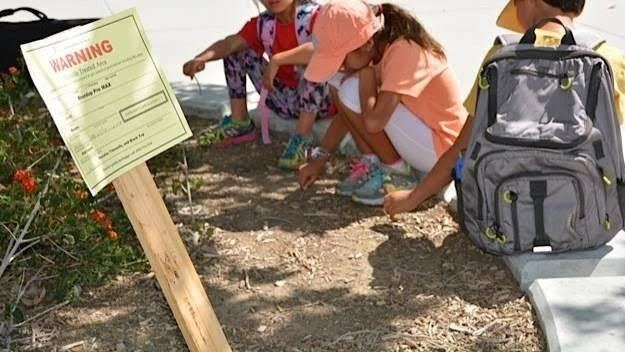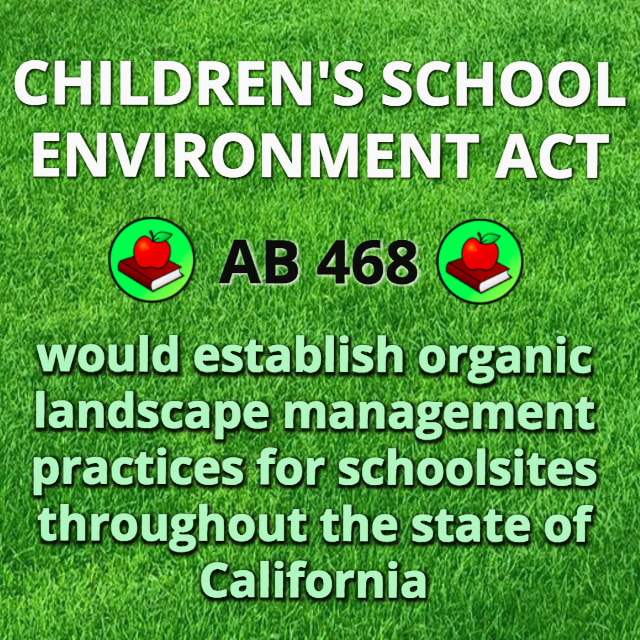|
Our co-founder, Kathleen Hallal shares her thoughts on why CA Bill AB 468, the Children's School Environment Act is needed. Kathleen was an original founding member of a citizen's group that helped implement a landmark organic policy in Irvine, California. She co-founded Non Toxic Communities in 2016 to take her advocacy for organic land care to other cities, schools, and HOAs. Now, Kathleen is leading the charge in her home state to protect children from pesticides on school grounds. Why shouldn’t we have a statewide organic policy throughout our state? Connecticut has one. New York has one. Why not CA? Aren’t we supposed to be the “progressive state”? Really, it’s time for everyone to look around and start asking questions. Who decided that our tax dollars should be spent on pesticides that might seem more convenient, but are not great for anyone’s health? I think the recent landmark lawsuit won by Dwayne “Lee” Johnson really brought this issue to the forefront. Two important realizations came out of that suit. The first thing was that Roundup, which is casually being used everywhere from our parks to our food supply, can cause cancer. The second thing, and something that is even more fascinating, was seeing Monsanto’s own correspondence showing clearly how they go about “buying” science, and even influencing regulators. In light of that information, clear as day for all to see, how can anyone continue to use glyphosate, or any other toxic products, around children? What is boils down to is this: Why are we using toxins around our youth for aesthetic purposes when we don’t have to? In study after study, epidemiologists are stating that it is startlingly clear that even tiny exposures to chemicals typically used in school yards are having a detrimental effect on children’s health and learning abilities. Hence this bill, authored by the Honorable Assemblyman Al Muratsuchi, who represents California’s 66th District. AB 468 is sponsored by The California Guild, and it is co-sponsored by Non Toxic Communities and Beyond Pesticides. Assemblyman Muratsuchi is representing an issue that his constituents have brought forward. In other words, he cares, and he is standing up to do something to protect kids! Modeled on Irvine’s successful policy implemented over the past three years, the bill quite reasonably asks for organic practices to be employed for all maintenance needs. There is an exception for which stronger chemicals may be used in case of an emergency if children’s lives are endangered. But just for your standard dandelions? It’s a no go. A lot of people thought it might be a good idea to simply ban glyphosate. But the problem with that is that the next day a toxic cousin like glufosinate could be substituted, and all of the other toxic products currently employed by most districts would just continue on. No, what needs to be done here is to have a completely new approach. One that puts the health of the children, and not necessarily “convenience,” first. This is a whole new mindset. Costs are about the same: districts buy less product but pay for a few more hours of work. There are significant water savings. But most importantly, such practices help to preserve children’s health. Can anyone put a price on that? Let’s stop applying toxins where children play! We are excited to be co-sponsoring the Children's School Environment Act (CSEA) with Beyond Pesticides, sponsored by the California Guild. Our Advisor, Christina Shea, Mayor Pro Tem of Irvine, has been busy reaching out to elected officials throughout the state of California in support of AB 468, (Muratsuchi), D-Torrance, to share Irvine’s success and to encourage other schools and communities to transition to organic land care. Studies have shown that where organic methods of maintenance are adopted, soil health improves, and water use and costs decrease. That is just what we are seeing in Irvine. The City of Irvine adopted this organics-first landscaping policy in February 2016. Since then the City of Irvine has successfully, and organically, maintained all pest pressure from weeds to rodents, on more than 570 acres of community and neighborhood parks, athletic fields; over 6,000 acres of open space, over 800 acres of public right-of-way, including street medians and parkways; 70,000 trees; and nearly 1.5 million square feet of facilities. The organic landscaping policy protects open space reserves, multiple wild life habitats, children, pets and families from exposure to toxic pesticides in all city-maintained space. The City of Irvine has demonstrated that you can have beautiful parks, athletic fields, and open space, that meet community expectations, without the use of toxic pesticides. In fact, over 160 cities across America have implemented some form of this policy. Increasingly, studies show that many of the products people assume are safe are actually being shown to cause harmful effects, especially to children, even in tiny amounts. It’s time we stop applying toxic chemicals around our youth when safer, cost-effective methods are available. We are very grateful to Assemblyman Muratsuchi for his vision and positive action to protect school children from toxic pesticides where they play and learn in all communities throughout California. How you can help California residents, please help us support requiring organic landscape management at schoolsites by sending a letter of support for AB 468 (Muratsutchi) the Children's School Environment Act (CSEA). Send letters to the author, Assemblyman Muratsuchi and also to Assembly Education Committee. The first hearing on the bill is March 27th in Assembly Education Committee. Deadline for letters is Tuesday the week prior to hearing: March 19, 2019 at 5:00 p.m. Copy and paste the email addresses of Assembly Education Committee, Author and staff: to: [email protected] cc: [email protected], [email protected], [email protected], [email protected], [email protected], [email protected], [email protected], [email protected], [email protected], [email protected], [email protected] Letters should be addressed to Assemblyman Muratsuchi, and to the Chair of the Education Committee. The Honorable Al Muratsuchi 66th Assembly District State Capitol, Room 2179 Sacramento, CA 95814 Send support letters to the Author by e-mail: Staff: [email protected] The Honorable Patrick O'Donnell, Chair Assembly Education Committee 1020 N Street, Room 159 Sacramento, CA 95814 (916) 319-2070 [email protected] Staff: [email protected] Vice Chair Kevin Kiley, Vice Chair (916) 319-2006 [email protected] Staff: [email protected] Assembly Member Ash Kalra Phone (916) 319-2027 [email protected] Staff: [email protected] Assembly Member Kevin McCarty (916) 319-2007 [email protected] Staff: [email protected] Assembly Member Christy Smith (916) 319-2038 [email protected] Staff: [email protected] Assembly Member Shirley N. Weber (916) 319-2079 [email protected] Staff: [email protected] https://calegislation.lc.ca.gov/Advocates/ Deadline for letters is Tuesday the week prior to hearing: March 19, 2019 at 5:00 p.m. The first hearing for AB 468 is scheduled on Wednesday, March 27th at 1:30 p.m. in Room 4202 of the State Capitol. Read a summary of the bill here. See a sample letter here. |
Archives
March 2024
Categories |
|
Non Toxic Communities is a 501 (c) (3) charitable organization
Nontoxic Communities Foundation, Inc. dba Non Toxic Communities Copyright © 2024 Non Toxic Communities - All Rights Reserved Site design by Bee Rooted | About Us | Contact Us |


 RSS Feed
RSS Feed
